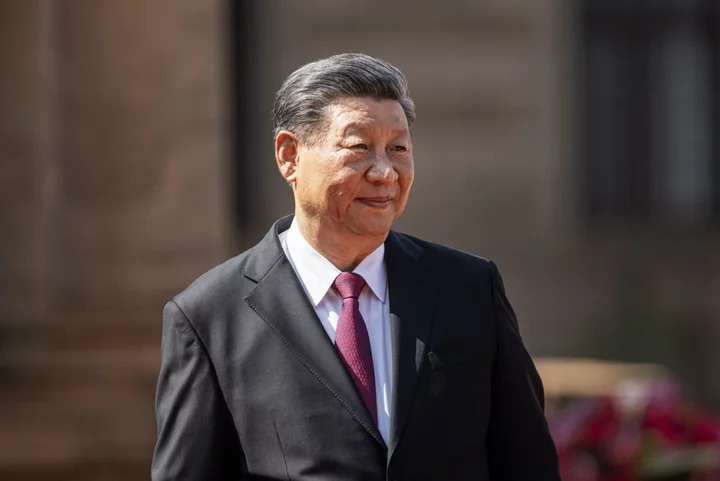President Xi Jinping is set to further tighten his control of China’s $61 trillion financial industry as he gathers state leaders and top bankers to set the direction over the next five years.
Against a backdrop of record low margins for the banking industry and an anti-corruption crackdown that has ensnared more than 100 officials and executives this year, Xi will host the closed-door, twice-a-decade Financial Work Conference on Monday and Tuesday in Beijing.
Xi, China’s most powerful leader since Mao Zedong, is expected to place the Communist Party’s “centralized and unified” leadership and increased scrutiny over the sector above all other policy objectives, analysts and academics said. Financial stability will also be a top priority, as authorities seek to prevent a sluggish economy and troubles in the property industry spreading deeper into the banking sector.
The conference “could turn out to be a monumental event for the financial sector,” Bloomberg Intelligence economists led by David Qu wrote in a note Friday. “A debt-laden property sector that’s threatening to rock the financial system adds urgency to the agenda.”
The closely-watched gathering comes at a pivotal time for China amid growing questions over the country’s political and economic trajectory, in part spurred by Xi’s crackdown on broad swathes of the private sector. Foreign investors have been pulling money out of the country at a record pace and Wall Street firms such as Goldman Sachs Group Inc. have scaled back ambitious expansion plans.
The conference, which was delayed by a year due to China’s strict Covid-zero approach, was first held in 1997 in the wake of the Asian financial crisis. The gathering’s overarching goal is to push for financial reforms that aid economic growth and safeguard stability. Its importance has grown in recent years, with the latest meeting in 2017 presided by Xi himself, while the preceding ones were overseen by China’s premiers.
Here are some key topics that’ll likely top the agenda:
Party Leadership
Xi will likely use the meeting to underscore recent changes. Earlier this year, oversight of the financial industry was revamped with the creation of an enlarged national regulator and a shift of some responsibilities from the central bank to a Chinese Communist Party-controlled body.
The CPC has asserted its control over the sector with its anti-corruption drive and regulatory reforms, said Sheng Songcheng, a former director of the People’s Bank of China’s statistics and analysis department. “The meeting will undoubtedly place the leadership of the Party’s Central Committee over all financial work at a prominent position.”
Xi has also been pushing the finance industry to slash salaries and what one top body called its “hedonistic” ways to comply with his signature issue of “common prosperity.” The Chinese leader has further boosted the Party’s influence over the sector via an ideology push that requires bankers to study the volumes of books with his thoughts.
Stability & Risks
It’s critical that authorities offer a clear direction at the meeting on resolving debt problems and preventing a crisis, Qu said, adding regulators may seek to limit moral hazard through stricter oversight.
Beijing has over the past year asked the nation’s largest banks to shoulder some of the responsibility by providing credit support to troubled developers as well as local government financing vehicles, which sit on a $9 trillion pile of debt. Their increasing exposure has prompted warnings from some analysts that it could be a drag on the systematically important banks.
China will likely further hold local governments accountable for resolving existing hidden debt and preventing new illicit liabilities, said Liu Xiaochun, deputy director of think-tank Shanghai Finance Institute.
Authorities may also speed up reforms of the pre-sale mechanism in the home market to aid its recovery, according to Liu.
Financial Reform
With China likely prioritizing financial stability over the coming years, the chances are slim for any drastic, large-scale institutional reforms of the financial system, said Raymond Yeung, chief economist for Greater China at Australia & New Zealand Banking Group Ltd.
Still, the conference may end in clearer assignment of duties between the central bank, the National Administration of Financial Regulation and the China Securities Regulatory Commission that form its financial oversight framework, Liu at the Shanghai Finance Institute said.
More clarity could also be expected on the functions of the financial stability committee, which China’s newly formed Central Financial Committee took over from the State Council in March, he said.
Serve the Economy
Policymakers may further instill the principle that the financial sector should serve the real economy at the meeting and offer guidance on what that entails, according to Bloomberg Intelligence’s Qu.
That could mean a push for more lending to key industries such as high technology, new energy and environment protection, Qu wrote, adding initiatives to boost consumption and service sectors may also be covered.
According to Sheng, the meeting may also push for more support for high technology sectors and weaker areas such as agriculture and water projects in rural areas.
China’s economy showed signs of improvement in the third quarter, with gross domestic product growing 4.9% in the period from a year earlier. Retail sales jumped 5.5% in September, well above forecasts and the highest reading since May.
Authorities may also offer a hint on further opening up the financial sector and beefing up financial governance to better cope with the changes in global political and economic environment, according to Liu at the Shanghai Finance Institute.

